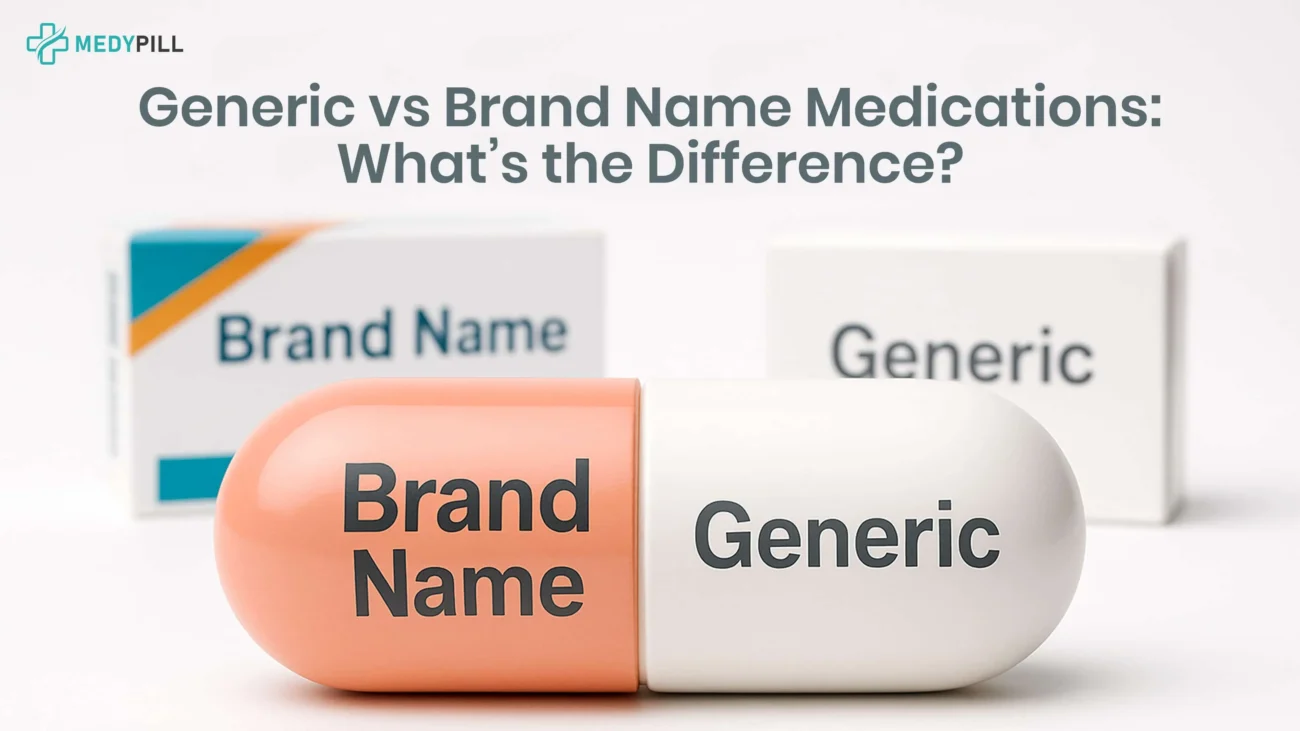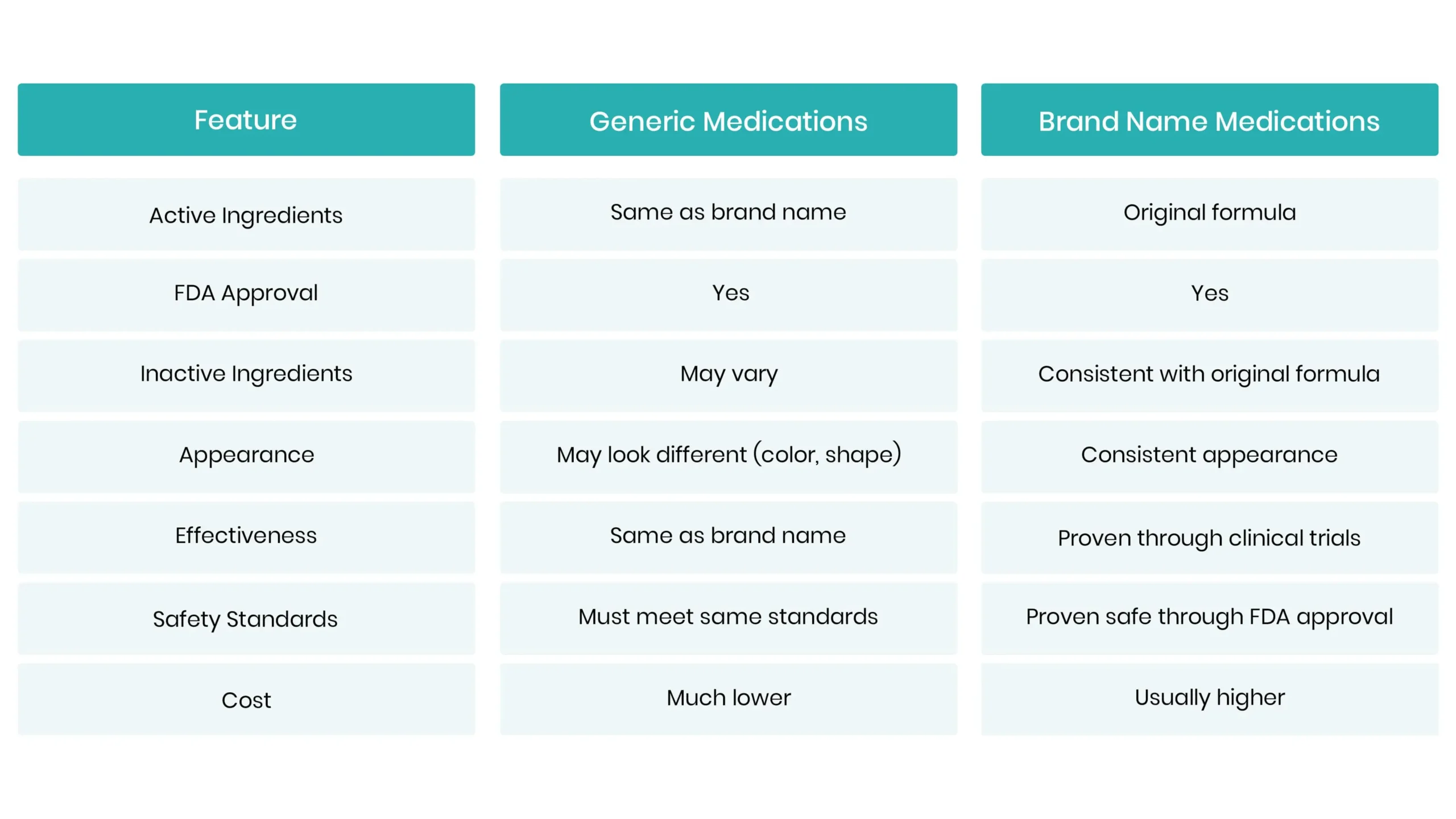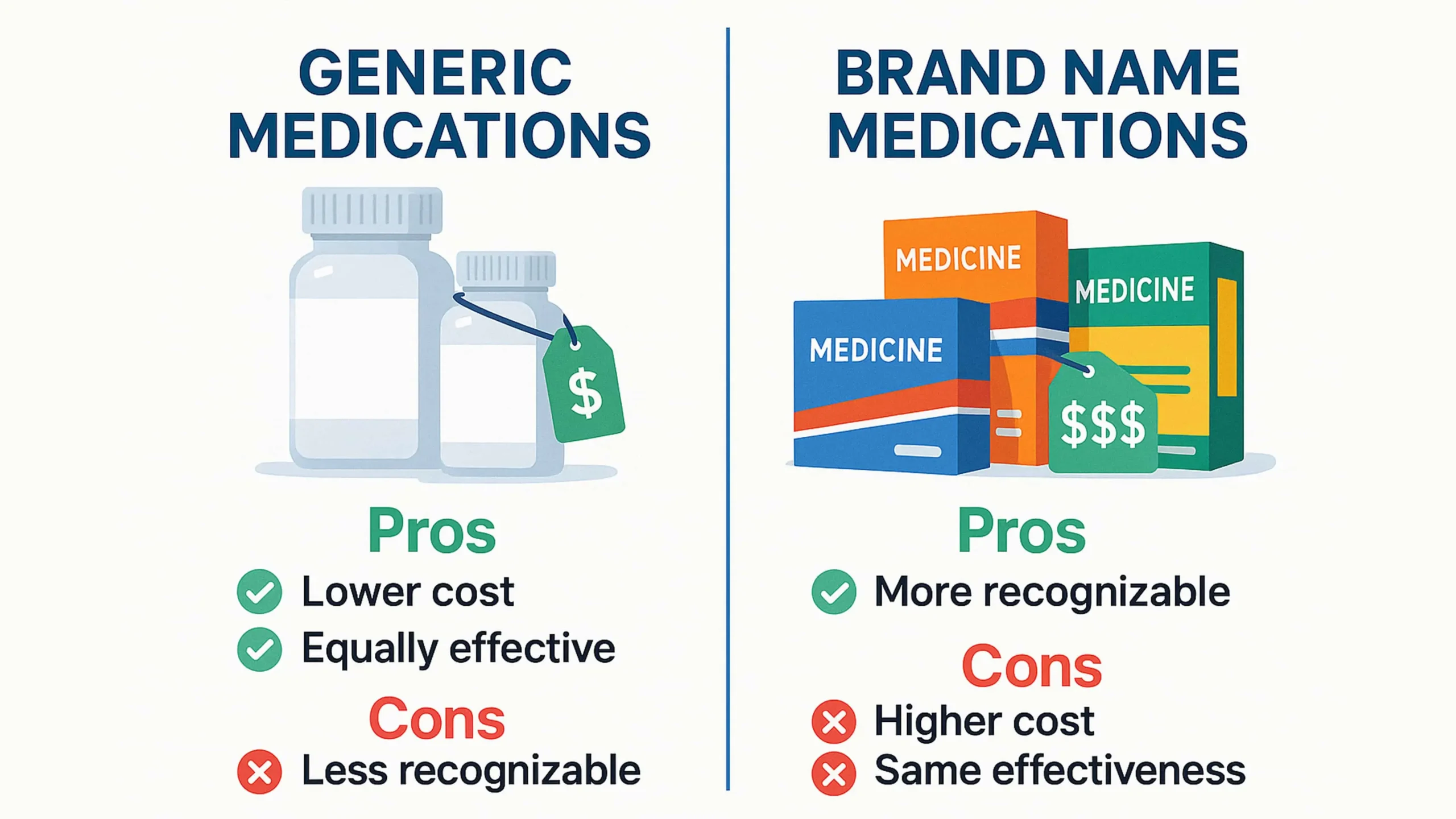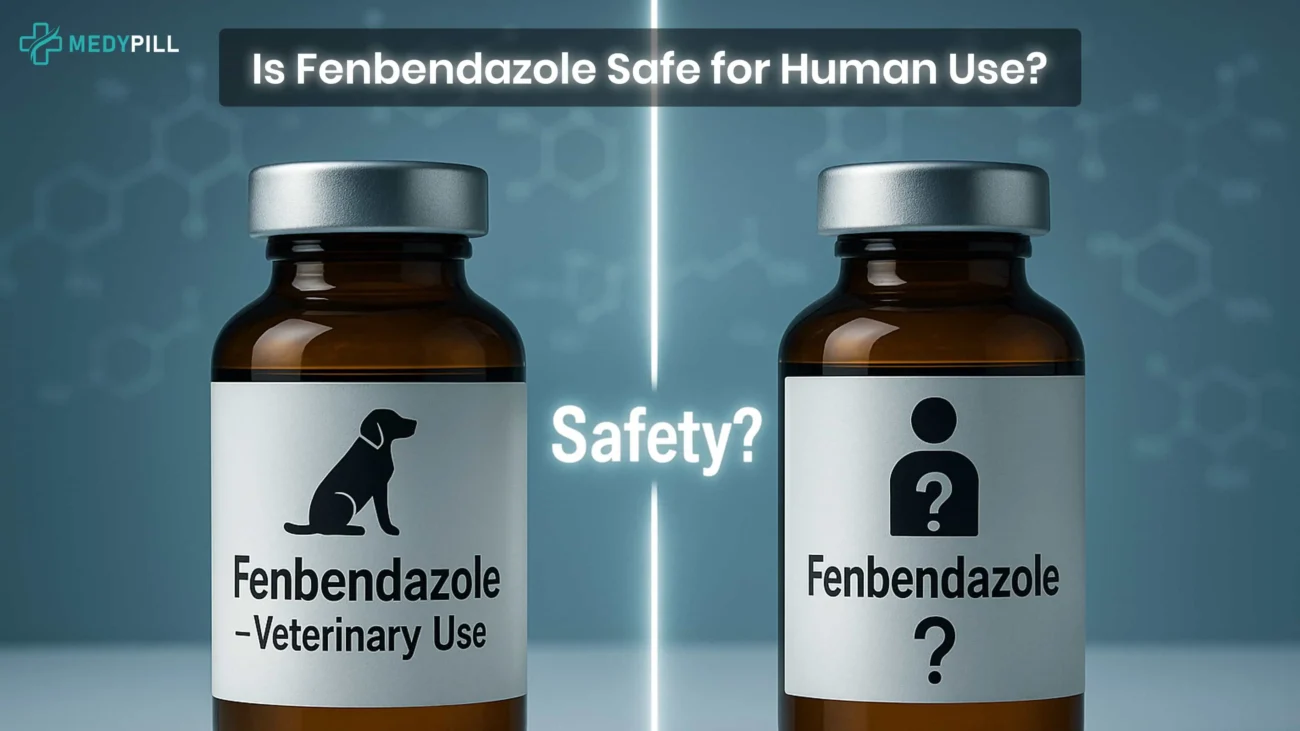
Generic vs Brand Name Medications: What’s the Real Difference?
Generic and brand name medications work the same.
They treat the same conditions and use the same main ingredients. The big difference is price generics are much cheaper.
In fact, 91% of prescriptions in the U.S. are filled with generics, but they make up only 18.2% of total drug spending.
This simple difference has a big impact on your wallet and healthcare decisions.
What Are Brand Name Medications?
Brand-name medications are the original drugs made by pharmaceutical companies. They are the first versions of a medicine to be approved by the FDA after years of research and testing.
These include well-known names like Lipitor (cholesterol), Nexium (acid reflux), Advil (pain relief), Zoloft (depression), and Synthroid (thyroid hormone).
You can explore more brand medications and their affordable options at Medypill.
Because of the research, development, and marketing costs, brand-name drugs are often more expensive.
Also read: How to Buy Cheap Medicine Online Safely
What Are Generic Medications?
Generic medications are copies of brand-name drugs made after the original patent expires. They contain the same active ingredients and work the same way in the body.
The FDA requires generics to meet the same quality, strength, and safety standards as the original drugs. While the shape, color, or fillers may differ, the main medicine inside is the same.
Generics usually cost much less because companies don’t have to pay for original research or advertising.
Generic vs Brand Name Medications: Key Differences
Here’s a quick comparison of the main differences:

Are Generic Medications as Effective and Safe?
Yes, generic medications are just as safe and effective as brand-name drugs. The FDA requires them to show the same results in the body as the original version.
For example, the generic version of Lipitor (atorvastatin) lowers cholesterol just like the brand name. Many doctors, pharmacists, and patients trust generics because they’ve been proven in millions of real-world prescriptions.
In fact, the FDA says generics must be “bioequivalent” to brand drugs, which means they deliver the same amount of medicine into your bloodstream in the same time frame.
Also: Most Complete List of New ED Medications
When Should You Choose Brand Over Generic?
Most of the time, generic drugs are a smart choice. But in some cases, a brand name may be better:
- If your doctor believes a specific brand works better for you
- If you have allergies to certain inactive ingredients in the generic
- If you’re switching medications and want to avoid small changes
Always talk to your doctor or pharmacist if you’re unsure. They can help you decide what’s right for your condition.
Cost Analysis: How Much Can You Really Save?
The savings can be huge. In the U.S., 91% of all prescriptions are filled with generic drugs, yet they account for only 18.2% of total drug spending.
According to the Association for Accessible Medicines, generic and biosimilar drugs saved the U.S. healthcare system $373 billion in 2021 alone.
This means patients can often pay 80–85% less for the same treatment when choosing a generic over a brand-name drug.
Related: Ivermectin Uses in Humans: Complete Guide for Safe & Effective Treatment
Pros and Cons of Generic and Brand Name Medications

Both generic and brand name medications have their place in healthcare.
Here’s a clear breakdown of the good and the not-so-good for each:
Generic Medications:
Pros
- Cost a lot less, which helps people stick to their treatment
- Work the same as brand name drugs
- Easy to find at most pharmacies
Cons
- May look different, which can confuse some patients
- The fillers used might cause mild reactions in a few people
Brand Name Medications:
Pros
- Consistent in look and feel, which some patients prefer
- Trusted by doctors who’ve used them for years
Cons
- Usually much more expensive
- Often not fully covered by insurance plans
A real-world example: In 2021, generic drugs saved Americans $373 billion in healthcare costs (Source: Association for Accessible Medicines).
That shows how big of a difference choosing generic can make especially for long-term treatments.
Also read: Is Fenbendazole Safe for Humans? Truth Behind the Antiparasitic Trend
Conclusion
Generic medications offer the same treatment as brand-name drugs at a much lower cost.
They are safe, effective, and FDA-approved. In most cases, choosing a generic makes sense, especially for long-term prescriptions.
However, always check with your doctor if you have concerns about switching. What matters most is that your medication works well for your health and fits your needs.
FAQs
What is the difference between brand name and generic medications?
Brand name medications are the original drugs developed and marketed by pharmaceutical companies after extensive research and FDA approval. Generic medications are copies made after the original patent expires, containing the same active ingredients but usually costing much less.
Are generic medications as effective as brand name drugs?
Yes. The FDA requires generics to be “bioequivalent” to brand-name drugs, meaning they work the same way in the body and provide the same medical benefits.
Why are generic drugs cheaper than brand name drugs?
Generics are cheaper because manufacturers don’t have to pay for the original research, clinical trials, or heavy marketing campaigns. They only need to prove their drug matches the brand in quality, safety, and effectiveness.
Do generic and brand name drugs have the same ingredients?
They have the same active ingredient, but inactive ingredients like fillers, dyes, or binding agents may differ. These differences usually don’t affect how the drug works, but in rare cases, they may cause mild reactions in sensitive individuals.
When should I choose a brand name medication instead of a generic?
You might choose a brand name if you have allergies to inactive ingredients in the generic, if your doctor thinks the brand works better for you, or if you want consistency in pill appearance for easier recognition.
Are generic drugs safe?
Yes. Generic drugs must meet the same FDA safety, quality, and manufacturing standards as brand name medications. Millions of prescriptions prove their safety and effectiveness in real-world use.
How much can I save by choosing generic drugs?
Patients can often save 80–85% compared to the cost of brand-name medications. In 2021, generic drugs saved the U.S. healthcare system $373 billion.
Do generic drugs look the same as brand name versions?
Not always. Generics may have different shapes, colors, or packaging due to trademark rules, but these differences do not affect how the medicine works.
Can insurance affect whether I get a generic or brand name drug?
Yes. Many insurance plans encourage the use of generics to reduce costs, and some may not cover brand name drugs unless your doctor specifies it is medically necessary.
Which is better: generic or brand name medication?
Both are effective and safe. Generics are usually the more cost-effective choice, while brands may be better in rare situations where inactive ingredients or patient preference matters. Always discuss options with your doctor.

Aug 12, 2025
Fenbendazole is not considered safe for human use according to the FDA and major medical bodies. While some people are using it off-label, especially in…
VIEW DETAILSAug 12, 2025
Semaglutide helps people lose weight by lowering hunger and making them feel full for longer. It’s available as a weekly…
Aug 10, 2025
Ivermectin is a medicine used to treat several parasitic infections in humans, such as river blindness and intestinal worms. It…

